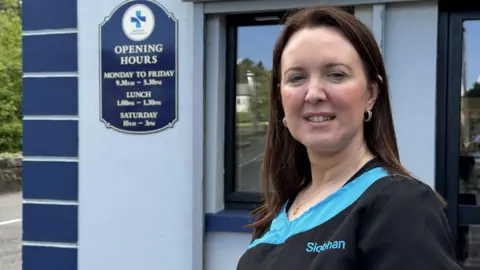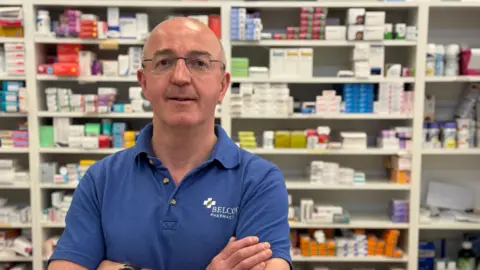Funding crisis ‘has closed 12 pharmacies’
Julian Fowler,BBC News NI

 BBC
BBC
Pharmacies in Northern Ireland say they are dispensing prescription medicines at a loss as they are not being reimbursed the full cost.
Siobhan McNulty, who runs Melvin Pharmacy in Garrison, County Fermanagh, says she relies on sales of makeup and gifts to “keep the ship running” and subsidise the cost of dispensing prescriptions.
A spokesperson for the DoH said the department has developed a strategic plan which includes increasing core funding for pharmacies.
Community Pharmacies NI say the funding crisis has led to the closure of almost a dozen pharmacies over the past 18 months.
The organisation says there has been no agreed contract in more than 14 years and have called on the Department of Health (DoH) to put in place a drug tariff specific to Northern Ireland.
Supplies ‘being limited’
Ms McNulty said she had to limit supplies to patients of a life-saving drug for cholesterol after the cost increased from £1 to £2 per box of 28 tablets to £17.
“The department will usually eventually catch-up with the price increase but at a time of their suiting so I may have already dispensed 100 boxes of that before I get reimbursed the increased price.
“In that situation we were actually giving patients seven days supply and asking them to come back in another seven days in the hope that the price would have gone down.”
She added that her shop was “propping up” the dispensary.
“I find myself at home at night researching beauty products, making TikToks and Instagram videos, things that a community pharmacist should not have to do,” Ms McNulty told BBC News NI.
‘We’re living day-to-day’


Joe McAleer runs pharmacies in Belcoo and Enniskillen and says the funding crisis is having an impact on patients.
“We can’t afford to stock the volume of medicines we had before, we haven’t the money to actually invest in the stock.
“A lot of pharmacies now can only order in as a prescription comes in, we’re just living day-to-day,” he said.
“Patients are having to make multiple journeys to come in and collect their medicines because the pharmacy hasn’t got it.”
Mr McAleer said increased costs of running the business, such as rates, utility bills and staff wages, meant he had cut back on staff hours and increased his overdraft.
“I know other pharmacies have increased their overdraft, they’ve increased their loans, they are maxed out on their credit cards trying to pay the bills, they’re juggling the wholesalers, they’ve introduced private funds,” he said.
“They depend on sales on the shop floor of shampoos and shower gels to actually pay for the medicines for the patients and that’s an unacceptable situation.“
‘What are we going to do?’
In Ballyclare one of three pharmacies in the town has closed.
Local resident Colin Gilliland says the loss would have an impact on older people in the community.
“If they keep closing them, then what are we going to do?” he said.
“I feel sorry for the older ones. I think the ones who can’t drive and are dependent on a pharmacy really do need it.”
Pharmacists say they want to be able to offer more services to help ease pressures on GPs and Emergency Departments, but that can only happen alongside increased investment and resources.
The DoH said it continued to invest in the community pharmacy sector despite “severe budgetary pressures”.
A spokesperson said the level of government funding provided to community pharmacies “compared favourably” to other parts of the UK.
They added that there were more pharmacies per person in Northern Ireland than elsewhere in the UK.
“The Department’s ‘Community Pharmacy Strategic Plan 2030’ aims to fully realise the potential of community pharmacy services to support better health outcomes from medicines and prevent illness,” the spokesperson said.
“Implementation in 2024-25 is associated with an increase in community pharmacy’s core funding of £19m compared to 2023/24 but full delivery will require additional funding, given the current financial constraints this will require a phased approach.”








